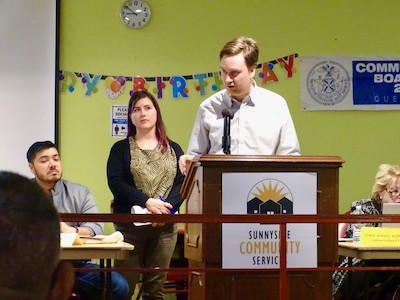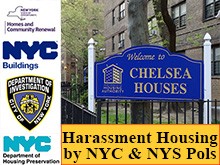City of Yes Text Amendments - Huge Zoning Changes in the Works
How Much Will the Proposed 'City of Yes Text Changes' Strip Communities of Input into What is Built in their Communities & What Activities Take Place within Each Property?
 Updated March 9, 2024 from 3.6.24 / NYC Neighborhoods / NYC Real Estate / NYC Government & Politics / City of Yes Zoning Changes NYC Special Report Series / News Analysis & Opinion / Gotham Buzz NYC.
Updated March 9, 2024 from 3.6.24 / NYC Neighborhoods / NYC Real Estate / NYC Government & Politics / City of Yes Zoning Changes NYC Special Report Series / News Analysis & Opinion / Gotham Buzz NYC.
On Thursday, February 1, 2024 I attended a Community Board 2 Queens meeting about the proposed City of Yes Text Amendments at the Sunnyside Community Services Center. The presentation was given by the Department of City Planning and the focus was the second piece of the massive, nearly 1,157 page City of Yes Text Amendment proposal.
The photo at right shows two City Planning Department representatives fielding questions from the audience following their presentation of the zoning law changes proposed in the City of Yes Text Amendments - Part II - Economic Development.
What are the City of Yes Text Amendment Zoning Law Changes?
The first segment of the proposal included changes to zoning in order to enable green energy powered buildings. The second segment of the proposal, which was what this meeting was all about, was to make changes to zoning laws to provide more zoning flexibility to enable more economic opportunity. And the third segment of the City of Yes Text Amendments is to address the need for affordable housing. As previously mentioned, for the purposes of this report, we're sticking to the second segment of the three part proposal, which moved front and center following the passage of the green energy initiative passed by the City Council in December of 2022.
City of Yes Text Amendment Changes - Part II - Economic Development
I am including a slide show from the February 1st, 2024 meeting mentioned above. And I have also reached out to Alicia Boyd, a Brooklyn activist in this area, and have obtained her permission to post a slide show she presented on January 16, 2024 at the Richmond University Medical Center on Staten Island. By providing you with both slide shows you'll obtain both a 'Pro' perspective and a 'Con' perspective. The Pro perspective, provided by the City Planning Department, also includes a description of the specific changes to the zoning laws for which they are advocating. We'll have more on this in the coming weeks because we think it is one of the most important issues of the day and the City Council is expected to vote on it in April 2024.
- CLICK here to read the rest of our report, including competing slide shows about the proposed City of Yes Test amendments - Part II - Economic Development. As of this post we've not yet heard back from Alicia Boyd of MTOPP, but expect to hear from her today / tomorrow or by the end of the week. So please stay tuned.
City of Yes Text Amendments - Huge Zoning Changes in the Works
How Much Will the Proposed 'City of Yes Text Changes' Strip Communities of Input into What is Built in their Communities & What Activities Take Place within Each Property?
Updated March 9, 2024 from 3.6.24 / NYC Neighborhoods / NYC Real Estate / NYC Government & Politics / City of Yes Zoning Changes NYC Special Report Series / News Analysis & Opinion / Gotham Buzz NYC. Continued.
 The first slide show below was photographed at a Community Board meeting in Queens, wherein the Department of City Planning presented the proposed changes which are a massive overhaul of existing zoning regulations in NYC affected all five boroughs.
The first slide show below was photographed at a Community Board meeting in Queens, wherein the Department of City Planning presented the proposed changes which are a massive overhaul of existing zoning regulations in NYC affected all five boroughs.
A month later, in a Zoom conference I attended on Friday, March 8, 2024, City Planning Chair Daniel Garodnick [see photo at right] didn't seem to be able to tell us how much control Community Boards [aka communities] would lose, if the proposed City of Yes changes are passed.
He also didn't seem to be able to tell us what impact the zoning law changes could have on small businesses; as financiers, corporations and foreign investors swoop in to purchase locations along existing neighborhood retail corridors, outbidding the locals. And then not having to negotiate with the community about many of the activities that they could enable in their buildings.
The same significant loss of community input / control seems to hold vis-a-vis the erection of new buildings in neighborhoods.
The photo at right shows City Planning Department Chair Daniel Garodnick fielding questions from the press corps following his presentation of the City of Yes Part II - Economic Development.
Tenants Have No Real Say if a Portion of Their Building is Repurposed to Light Manufacturing
Garodnick also responded to a question about what rights tenants would have, if their landlord repurposed a portion of their building to light manufacturing or some other purpose. He told us, with a smile on his face, that the tenants can reach out to the DHCR for help. Based on prior research / investigation into the DHCR, the agency appears to be very ineffective when it comes to protecting / enforcing tenants' rights. So Garodnick's answer should be no consolation to tenants. The DHCR weakness is certainly a significant contributing factor to the loss of 96,000 affordable housing units renting for $1,500 or less in NYC in the years 2017 - 2021 [stats per Politico July 16, 2022].
Dueling Slide Shows - NYC Department of City Planning vs Community Activist Group MTOPP
Please note that both sides present the facts supporting their respective points of view, and in some cases may include opinions or assumptions which I have not yet been able to verify. Note that the opinions expressed within the content are solely the author's and do not necessarily reflect the opinions and beliefs of this website or its affiliates. The first slide show is by the NYC Department of City Planning and the second slide show is by Alicia Boyd of MTOPP in Brooklyn.
Lastly, why are the most sweeping changes to NYC zoning laws - which will significantly affect us all - not being covered by the billionaire / mega-millionaire owned / controlled TV news outlets?
Have a good week.





















































